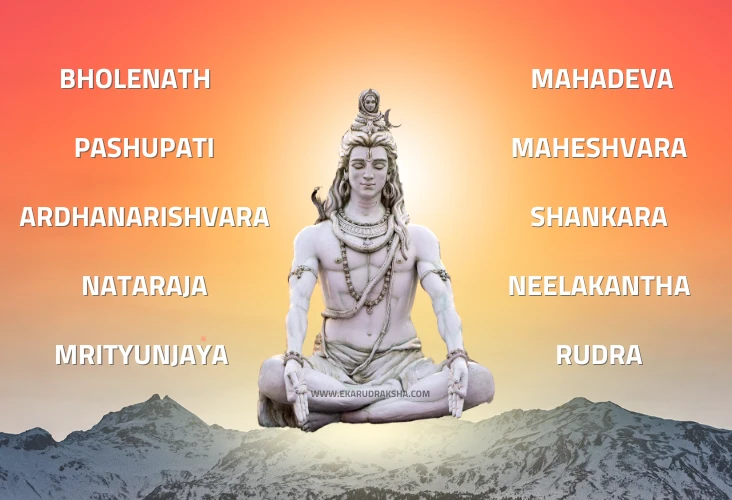Table of Contents
Introduction
Lord Shiva, one of the principal deities in Hinduism, is revered for his multifaceted nature that embodies both destruction and regeneration. Known by many names that reflect various aspects of his divine persona, each name carries profound spiritual meaning and symbolism. This essay delves into the significance of 10 names of Lord Shiva, shedding light on their theological, philosophical, and cultural implications.
Here's a concise list of the 10 names of Lord Shiva :
1. Mahadeva
2. Maheshvara
3. Shankara
4. Neelakantha
5. Rudra
6. Bholenath
7. Pashupati
8. Ardhanarishvara
9. Nataraja
10. Mrityunjaya
Now Let's describe the 10 divine names of Lord Shiva one by one
1. Mahadeva
The name "Mahadeva" translates to "Great God" or "Supreme God." It signifies Shiva's status as the ultimate deity in Hindu mythology, revered for his immense power, wisdom, and benevolence. Mahadeva represents the cosmic consciousness and the source of all existence, embodying the highest principles of righteousness (dharma) and compassion (karuna).
2. Maheshvara
Maheshvara, meaning "Great Lord," emphasizes Shiva's role as the supreme ruler and controller of the universe. As Maheshvara, Shiva governs cosmic cycles of creation, preservation, and destruction. This name highlights his authority over cosmic laws (rta) and his transcendental presence beyond material limitations.
3. Shankara
Shankara, derived from "Sham" (auspiciousness) and "kara" (bestower), denotes Shiva as the auspicious and benevolent deity who brings harmony and blessings to devotees. Shankara also signifies Shiva's role as the alleviator of suffering and the bestower of spiritual liberation (moksha), guiding souls towards enlightenment and inner peace.
4. Neelakantha
Neelakantha, meaning "Blue-Throated One," originates from the mythological tale where Shiva drank the poison (halahala) that emerged during the churning of the cosmic ocean (Samudra Manthan) to save the universe. His act of consuming the poison turned his throat blue, symbolizing his willingness to bear the burdens of the world and protect creation from destruction.
5. Rudra
Rudra, often translated as "The Roarer" or "The Howler," portrays Shiva's fierce and unpredictable nature as a deity associated with storms, thunder, and natural disasters. However, Rudra also embodies the benevolent aspect of Shiva as the compassionate healer who removes afflictions and grants blessings to his devotees.
6. Bholenath
"Bholenath," meaning "Innocent Lord" or "Simple-hearted One," reflects Shiva's childlike innocence, purity, and accessibility to his devotees. Despite his immense power and cosmic responsibilities, Bholenath is approachable and quick to grant boons to those who worship him with sincerity and devotion.
7. Pashupati
Pashupati, "Lord of All Beings," signifies Shiva's role as the protector and guardian of all creatures. As Pashupati, Shiva is revered as the patron deity of animals and the natural world, embodying the harmony between humanity and nature. This name underscores Shiva's compassionate and nurturing qualities towards all living beings.
8. Ardhanarishvara
Ardhanarishvara represents the divine union of Shiva and his consort Parvati (Shakti) in a single form, where the right half is masculine (Shiva) and the left half is feminine (Parvati). This composite deity symbolizes the inseparable relationship between the masculine and feminine energies (Shiva-Shakti) that sustain the universe's balance and cosmic harmony.
9. Nataraja
Nataraja, "King of Dancers," epitomizes Shiva's cosmic dance (Tandava), which symbolizes the rhythmic cycles of creation, preservation, and dissolution. As Nataraja, Shiva performs the Tandava dance within a circle of fire (prabha mandala), representing the eternal cosmic dance of life and death, creation and destruction.
10. Mrityunjaya
Mrityunjaya, "Conqueror of Death," is a powerful epithet of Shiva associated with overcoming mortality and conquering the cycle of birth and death (samsara). The Mrityunjaya mantra, dedicated to Shiva, is chanted for protection, healing, and spiritual rejuvenation, invoking Shiva's blessings to overcome adversity and attain immortality.
Conclusion
The names of Lord Shiva encapsulate the diverse aspects of his divine persona, each revealing a unique facet of his cosmic significance and spiritual symbolism. From Mahadeva, the Supreme God, to Mrityunjaya, the Conqueror of Death, these names resonate deeply within Hindu philosophy and mythology, offering profound insights into Shiva's omnipotence, compassion, and transcendental nature. As devotees contemplate these names, they gain a deeper understanding of Shiva's role in sustaining the universe and guiding souls towards spiritual liberation and eternal bliss.



Leave a Reply
0 Comments